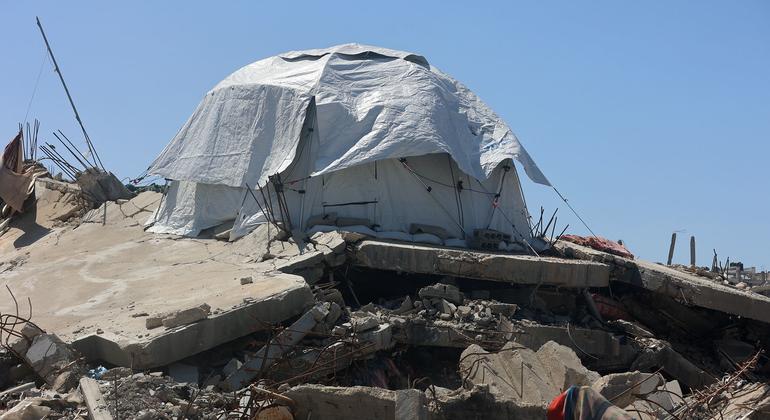Humanitarian agencies have reported that the number of displaced people in the Gaza Strip has exceeded half a million since Israeli airstrikes resumed on March 18. Stephan Dujarric, a UN spokesperson, highlighted in a recent press conference that this new crisis adds to the numerous families that were already displaced before the ceasefire.
Dujarric emphasized the lack of resources, stating that there are no tents available to provide to the affected. In the city of Bani Suhaila, in the Khan Younis governorate, families displaced in this latest wave of violence have only received a limited amount of blankets and waterproof tarpaulins.
The situation in Khan Younis is critical, according to a report from the Office for the Coordination of Humanitarian Affairs (OCHA) team that visited the displaced camps. There, conditions are alarming; many people live in overcrowded shelters and do not have access to food, water, or medicine. The airstrikes continue to impact the civilian population, leading to new deaths and the destruction of critical infrastructure.
The increase in acute malnutrition is a growing concern, leading humanitarian organizations to significantly reduce the number of children receiving supplementary feeding. Additionally, access restrictions have complicated the replenishment of medical supplies in hospitals, putting an increasing number of patients at risk.
Dujarric also highlighted the obstacles faced by humanitarian workers, who are lacking necessary supplies due to the closure of aid crossings. Israeli authorities have limited humanitarian operations, authorizing only two out of the six planned transfers, leading to a blockade in the replenishment of vital fuel for the region.
Despite the adversities, humanitarian organizations continue to strive to help the most affected, providing over a million meals daily to vulnerable people in Gaza. However, the assistance remains inadequate, as the majority of the 2.1 million inhabitants of the Strip rely completely on food assistance.
The UN spokesperson concluded by emphasizing that respect for international law is crucial and must ensure the protection of civilians, as well as access to essential needs for humanitarian and medical workers in the region.
Referrer: MiMub in Spanish










